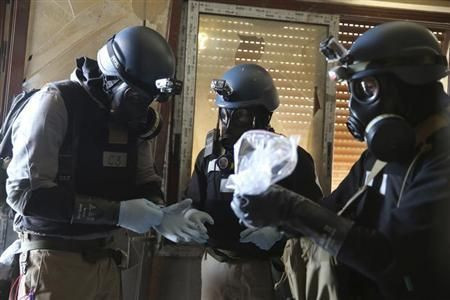Chemical Weapons Facilities In Syria Could Fall Into ISIS Hands

There are still 12 facilities that hold chemical weapons in Syria, the special coordinator for the Joint Mission of the Organization for the Prohibition of Chemical Weapons and the United Nations, told the Security Council Thursday. The announcement raised fears that the Islamic State, also known as ISIS, could seize the weapons and use them against civilians.
“This is a chemical weapons disarmament process, it’s been unique,” Sigrid Kaag, head of the joint mission dealing with Syria's chemical weapons, said in her briefing to the Security Council. Kaag said that the team is in the process of preparing to destroy the remaining sites, but did not set a timeline.
Kaag told reporters that the team had destroyed 100 percent of "priority chemicals" and 96 percent of the entire stockpile. She did not specify which chemicals were "priority."
Despite the mission's work in destroying Syria's chemical weapons, the United Nations Human Rights Council reported last month that President Assad had used chlorine gas against civilians.
The council endorsed the destruction of the rest of the regime's chemical weapon stockpiles in its meeting Thursday with a program that is set to begin with inspections Oct. 1.
Following the Security Council meeting, Ambassador Samantha Powers, in a Tweet, emphasized the importance of holding Assad accountable.
UNSC met today on Syrian CW. Must ensure regime ends chlorine use, resolves concerns on gaps in declaration & destroys remaining facilities.
— Samantha Power (@AmbassadorPower) September 4, 2014Must remember: not just ISIL targeting innocents in Syria, it's also Assad regime. Must hold ALL who inflict terror on civilians to account.
— Samantha Power (@AmbassadorPower) September 4, 2014© Copyright IBTimes 2025. All rights reserved.





















